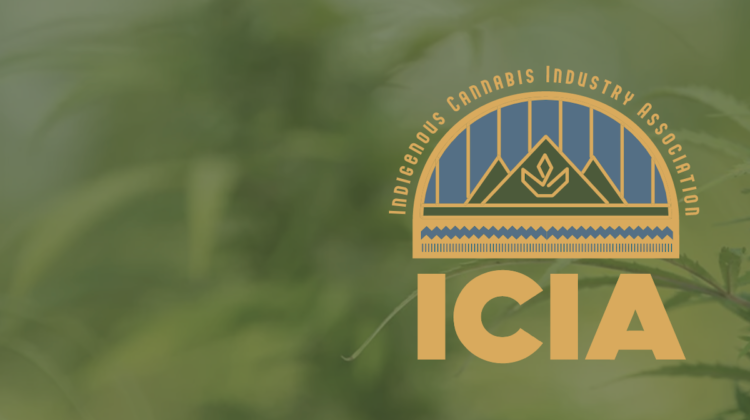
Advancing Indigenous Voices in the Cannabis Industry
Graphic by The Indigenous Cannabis Industry Association (ICIA)
With the emergence of the cannabis industry in the United States, The Indigenous Cannabis Industry Association (ICIA), aims to shift focus to tribal cannabis markets.
As a non-profit organization, ICIA is dedicated to advocacy and empowerment of Indigenous cannabis businesses and aspiring entrepreneurs nationwide.
Since each tribe has slightly varying relationships with federal and state governments, they face a unique situation with their cannabis markets. The resources the organization provides to tribes will vary accordingly.
“We’re trying to provide as many options as possible, based upon the landscape we’re currently looking at,” said ICIA founder and CEO Rob Pero to Politico.
ICIA’S Mission
Launched in August, the Indigenous Cannabis Industry Association exists to promote the exploration, development, and advancement of the cannabis industry for the benefit of all Indigenous communities.” ICIA creates opportunities for Indigenous people in cannabis and empowers the Indigenous community through policy, programming, and outreach initiatives.
The new organization was founded by Rob Pero, cannabis entrepreneur, owner of Canndigenous CBD, and member of the Bad River Band of the Lake Superior Tribe of Chippewa Indians in Wisconsin. Starting with tribal partners primarily from Wisconsin, Michigan, Washington, and Oregon, ICIA plans to be a resource for any tribe around the nation interested in cannabis or that already has a functioning cannabis market.
ICIA’s mission is twofold: providing resources to tribal cannabis programs and advocating for tribal interests at the state and federal levels.
“As stewards of environmental responsibility and with deep histories in agricultural expertise, Tribal governments and Indigenous people are uniquely positioned to add value to the cannabis industry,” said Pero, in a press release. “ICIA will help tribal communities and Indigenous entrepreneurs navigate the cannabis industry, preserve Tribal sovereignty, further economic opportunities, and bring their unique perspectives into the national conversations around policy, sustainability, and equity.”
Cannabis Policy Advocacy
ICIA strives to build “an equitable and sustainable Indigenous cannabis industry through sensible policy” according to the organization’s objectives. One of the ways the non-profit does this is by providing resources for Tribal governments and Indigenous people to design and advocate for better policies
On the federal level, ICIA is focusing on removing cannabis from the Controlled Substances Act. Pero says, “if and when that happens every state is going to need to have a plan for what that looks like.” Further, the federal government has not specified how it will allow tribes to set their own rules. With federal legalization looming in the future, ICIA seeks to guarantee Indian Country cannabis economic development and long-term strategic analysis by gathering data and information on tribes in cannabis.
ICIA also directly works with local representatives to support fair implementation and enforcement of sensible cannabis policies and relay information to Tribal Nations and the indigenous community.
“We are working directly with local representatives to support fair implementation and enforcement of sensible cannabis policies in our home state of Wisconsin,” Pero said. “We will continue to empower the Indigenous community and provide resources to Tribal Nations to influence policy at the state and federal levels and work to be a conduit of information for the community at large.”
Empowering Indigenous People in Cannabis
ICIA empowers indigenous people in cannabis by offering resources and educational and economic opportunities for Indigenous entrepreneurs, Tribal Nations, and communities. The organization hosts in-person educational events and workforce development, as well as dispensing business and cannabis conviction expungement resources.
Pero also hopes ICIA can be a resource to answer cannabis questions for tribes — from how to address outside companies that want to use tribal land to assisting tribal members interested in entering the cannabis industry.
“That, I think, is what we’re seeing as the biggest value added,” Pero explained. “To empower our independent tribal member-owned entrepreneurs to have a better understanding of the industry, and that there are mechanisms to help us be successful in this space.”
Connecting the Indigenous Cannabis Community
One of ICIA’s goals is to connect the indigenous cannabis community by giving access to their network to link Tribal Nations, industry partners, advocacy groups, mentors, businesses, and aspiring entrepreneurs. This in return, helps navigate the complex landscape of tribal, state, and federal policy, while providing means for Tribal governments and Indigenous people to design and advocate for equitable cannabis policies.
The organization also builds relationships between lawmakers, regulators, businesses, and consumers through events and speaking opportunities. ICIA serves Tribal Nations and Indigenous-led businesses as the leading Indigenous trade association in the nation, developing a roadmap for federal, state, and local lobbying.
Upcoming ICIA Actions
The organization is hosting what it considers a historic summit in Washington DC. ICIA’s two-day Indigenous Cannabis Policy Summit will be held on November 15 and 16.
ICIA’s Chief Operating Officer and Executive Director, Mary Jane Oatman, explained the summit will advocate for tribal interests in cannabis. “Our focus and goals are to ensure that we are advancing the inclusion and protection of tribal provisions in our nation’s capital. We have a long road ahead to advance our tribal communities in equity conversations, as many of our reservations still face unequal protections and disparate enforcement of laws regarding cannabis,” Oatman stated.
To learn more about ICIA’s strategic vision and work, visit indigenouscannabis.org.


Hope to get with the Hmong here in the USA to grow hemp and make clothes and shoes = We can do this across the USA please